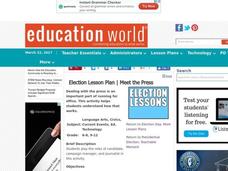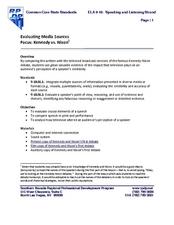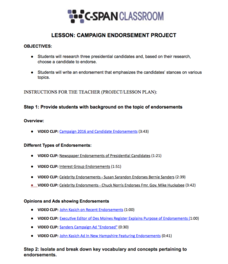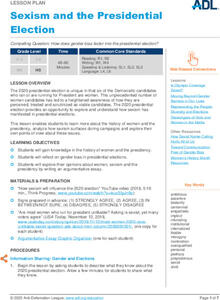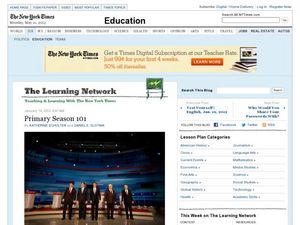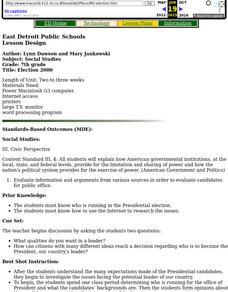Curated OER
Presidential Debate Primer
Students examine the function of presidential debates. In this civics lesson, students view segments of presidential and vice presidential debates. Students analyze the answers given in the debates and identify the platforms of the...
Curated OER
The Great Debate
Students watch tapes of televised presidential debates dating from 1960. They analyze debates and participate in mock debates.
Curated OER
Persuasion and Political Debate by PBS
Students examine rhetorical strategies. In this political debate lesson plan, students research issues of presidential campaigns and deliver persuasive speeches about the issues they research. Students then participate in debates based...
ProCon
Electoral College
The Electoral College's role in elections is sometimes confusing and controversial. Pupils use a debate topics website to research the pros and cons of the practice to debate whether the United States should still use the Electoral...
Curated OER
Presidential Endorsements: Newspapers Decide
Students read The Plain Dealer editorial about its "non-support" of a candidate and other articles about this and discuss the newspaper's role in the political process. Students then form an editorial board and debate which candidate...
Curated OER
Take a Stand!
Here is a four-corner debate-style activity specifically geared to election year issues. Learners group themselves according to whether they strongly agree, agree, disagree, or strongly disagree with statements that relate to elections...
Constitutional Rights Foundation
The Election of 1912
The Election of 1912: an election with four competitive opponents. Pupils get to know the candidates with informative reading passages that provide context to the election. Then, the class engages in a debate and answers questions as one...
Curated OER
The Debates
Students brainstorm a list of information that voters should know about candidates. In groups, they research their side of an argument in preperation for a debate. After observing media coverage, they compare and contrast the candidates...
Curated OER
Candidate Debate; Making Informed Voting Decisions
Pupils study the concept of what it means to be an informed voter who makes conscientious voting decisions based on significant information. In this making informed voting decisions lesson plan, students are introduces to a unit on...
Curated OER
Asking the Questions and Questioning the Answers
What would you ask a presidential candidate if you had the chance? Bring politics to your language arts classroom with this lesson, in which young readers brainstorm questions they would have liked the presidential candidates to answer....
Curated OER
Meet the Press
Students participate in a role play revolving around political elections. The roles of candidate, campaign manager, and journalist emphasized in this activity. Students listen to candidate interviews that are available online.
Southern Nevada Regional Professional Development Program
Evaluating Media Sources
Just how much influence did television have on the results of the 1960 presidential election? Media critics contend that the results were all about how the two candidates appeared on the screen. Give your young historians a chance to...
Curated OER
The Lincoln-Douglas Debates of 1858
Eleventh graders examine transcripts of the 1858 Lincoln-Douglas debates and create a platform for each candidate in the 1858 Senate race.
Curated OER
Active Voice
Students identify the qualities that contribute to effective verbal and non-verbal communication. They use those qualities as criteria by which to judge an in-class political debate on education.
Curated OER
The Presidential Nominating System
Students examine the process by which candidates for U.S. president are nominated by the Democratic and Republican parties. They identify the differences between primaries and caucuses and key terms and issues related to the primary...
C-SPAN
Campaign Endorsement Project
So many politicians, so many endorsements! Learn to differentiate between facts as well as the process of endorsements with an informative resource. Class members watch current endorsement videos, research candidates from three different...
Anti-Defamation League
Sexism and the Presidential Election
Young historians investigate how sexism impacted the 2020 United States presidential election. They examine media coverage of the six women candidates, engage in a four-corners debate reacting to statements about gender and the...
Curated OER
Primary Season 101
While this New York Times resource posted several months ago it could still be a useful learning experience. Learners practice using the Times's Campaign 2012 Politics section to help them answer 16 questions about the Republican...
iCivics
Cast Your Vote
Impress upon your learners the importance of researching candidates in an election and considering not only which issues are most important to them as voters, but also which issues are most important to the candidates.
ProCon
President Bill Clinton
Was Bill Clinton a good president? Scholars set out to answer the question as they prepare for a class debate on the topic. They watch videos, review pros and cons, and read facts about the process of becoming a United States president....
Constitutional Rights Foundation
Naturalized Citizens and the Presidency
Article II, Section 1 of the U.S. Constitution takes center stage in a lesson plan that asks class members to assume the role of state senators, debate a resolution to amend the U. S. Constitution to permit naturalized citizens to run...
Curated OER
Voting
Students participate in a role play where they run for office and address the issues they want to fix. In this voting lesson plan, students then vote on which candidate they want to run their classroom.
Curated OER
Election 2000
Seventh graders explore issues facing the potential leader of our country, form opinions about the candidates representing the two major political parties, research election material and choose candidates, conduct debates, and vote in...
Curated OER
Trade Wars: the Candidates Take a Stand
Students research topics related to trade, and develop a graphic organizer. They debate and discuss topics related to trade.












